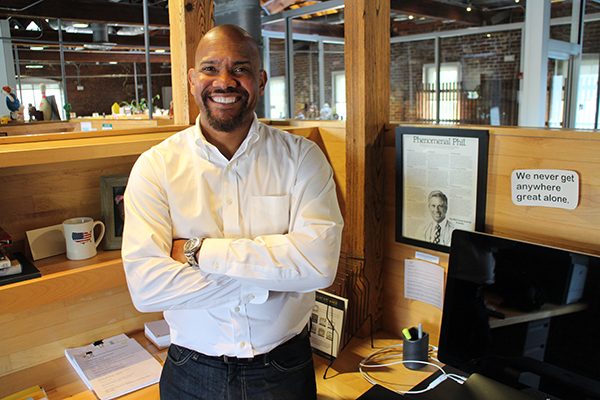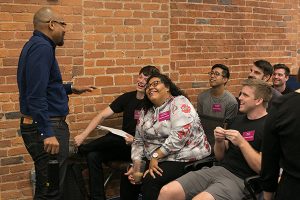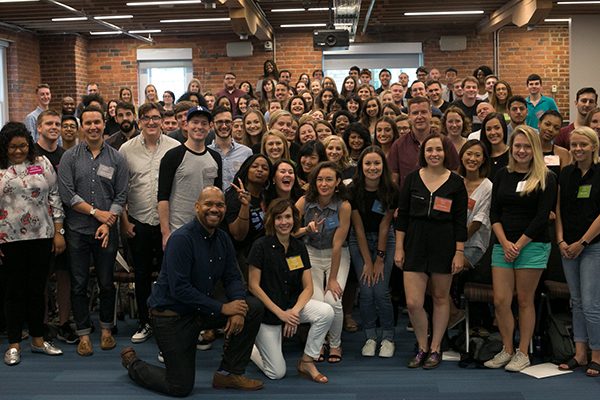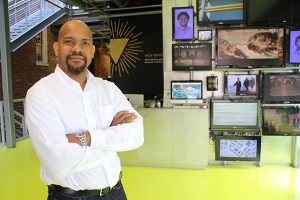After 25 years of agency work that took him to advertising powerhouses in New York and Atlanta, Richmond native Vann Graves has returned home.
The Army veteran, Harvard graduate and Open High School alum has taken the helm of the VCU Brandcenter, starting earlier this month as the school’s fourth executive director after stints at ad giants J. Walter Thompson and McCann, and a 15-year run at BBDO.
The move to the Brandcenter is a homecoming for Graves, who grew up in Richmond’s Ginter Park neighborhood, and whose great-grandfather worked at The Jefferson Hotel and in the hotel’s former carriage house that now houses the Brandcenter. He counts the late Brandcenter Chairman Mike Hughes, for whom the building is named, among his early mentors.
Richmond BizSense sat down with Graves, 49, the day before he met his first students for orientation. He discussed his goals for the school, the perspective he brings to it from his agency work, and his never-ending love for “The Far Side.” The following is an edited transcript:
Richmond BizSense: When did you get to town? What have you been doing since you arrived?
Vann Graves: I have now been at the Brandcenter one week, and I have to tell you, we’ve hit the ground running. It’s an amazing group of people, and faculty, staff have been welcoming, like, “Game on, what are we doing, how are we going to do it, let’s do some amazing things,” which is something that I wasn’t sure that I would see or feel in an academic setting. You definitely feel it in an agency setting, this buzz and this excitement, and I felt it here too.
RBS: What are you going to tell the students when you meet them tomorrow?
VG: You’ve stepped into a place that’s going to not teach you just how to make a book; our goal is to teach you to think – to think strategically and creatively – because we don’t know what the jobs are in the future.
When I started as an art director and copywriter, there wasn’t UX/UI (user experience/user interface design). None of those careers existed. So today, we really have to make sure that they can solve business problems creatively versus just making something look pretty. When I started, that’s really what the job was: You had a smart headline and beautiful design, and you were done.
RBS: Do you have specific goals you want to accomplish at the Brandcenter?
VG: I would love to be able to accept students tuition-free. I don’t have an answer yet, but I say that because my own personal experience, I graduated from graduate school $90,000 in debt. If I put that in today’s dollars, it would be a hell of a lot more than that.
RBS: What work have you been involved in that you’re proudest of or people might recognize?
VG: Probably “Field Trip to Mars,” which was for Lockheed Martin (Graves was executive creative director on the project while he was at McCann). The reason being, not just the fact that it won awards and all of that, but I was lucky enough to have a team … a motley crew of folks, such a great blend of people who helped win that client. To actually win that client with out-of-the-box thinking, to then help the client along the way to do something different, that led to “Field Trip to Mars.” The magic was the work done before we even got to awards.
RBS: What is your process with a team to cultivate ideas and decide on one?
Graves: My process is probably a very weird one – is take every idea and figure out what are the strongest ones and put them on the wall. Now let’s see are we telling the story we’re hoping to tell, and as we take those really interesting ideas, you start to shift pieces around to build that story out. Simultaneously, we’re starting to craft and design each idea even more as we solve for the larger narrative.
It’s really a spinning of a web, because you want to be able to poke holes into any given point so that after we’ve got all the stuff on the wall and kind of the basic narrative, I try to sell the work to my team. So we basically stress-test the work before it even gets to a point of making it pretty. Because we make certain assumptions as creatives that clients may not know or understand, they play the devil’s advocate against their own work, which allows for a better narrative to be told.
RBS: Do you have certain stimuli you go to for inspiration?
VG: One of my mentors in New York at BBDO, Donna Weinheim, would always have us look at The Far Side comics, and I still do to this day. It is my go-to. The interesting thing about The Far Side is there’s always humor, but on many topics, and it’s always relevant at any given point in time. It really gets the juices flowing.
RBS: What are your impressions of the Richmond ad scene? Are there any agencies here that you heard about or whose work you admired while you were away?
VG: I haven’t gotten to know a lot of folks here – I’ve only been back literally 10 days – but we’ve got (Brandcenter) alums that helped to establish Arts & Letters. I heard the buzz about them before I took this role. The Martin Agency has always been special to my heart, since Mike Hughes was a mentor of mine. Oddly enough, Danny Robinson (chief client officer at Martin) and his wife introduced me to my wife, so there’s an interesting connection with that.
RBS: If you could ask someone you admire one question, who would that person be and what question would you ask?
VG: Phil Dusenberry (the late chairman and chief creative officer of BBDO), who was one of my mentors. He was the person who I met as an intern at BBDO who’s like, “When you graduate from school, you’re going to work here.” He was true to his promise, and I worked there for 15 years.
It would be around, how do you ensure that your teams are doing great work so that they can become great creatives? He was so good at making sure that his teams do great work, thus becoming great teams. I’ve seen it, I saw what he did, I knew when it worked – but (also) how he got to that point. I would wonder how he would do it in these times, with so much change so quickly. During his career, it was still print, radio and TV, and that’s it. When you know that that’s going to be your platform for your whole career, it’s easier to focus on greatness, but how do you do it when I don’t know what the next “thing” is?
After 25 years of agency work that took him to advertising powerhouses in New York and Atlanta, Richmond native Vann Graves has returned home.
The Army veteran, Harvard graduate and Open High School alum has taken the helm of the VCU Brandcenter, starting earlier this month as the school’s fourth executive director after stints at ad giants J. Walter Thompson and McCann, and a 15-year run at BBDO.
The move to the Brandcenter is a homecoming for Graves, who grew up in Richmond’s Ginter Park neighborhood, and whose great-grandfather worked at The Jefferson Hotel and in the hotel’s former carriage house that now houses the Brandcenter. He counts the late Brandcenter Chairman Mike Hughes, for whom the building is named, among his early mentors.
Richmond BizSense sat down with Graves, 49, the day before he met his first students for orientation. He discussed his goals for the school, the perspective he brings to it from his agency work, and his never-ending love for “The Far Side.” The following is an edited transcript:
Richmond BizSense: When did you get to town? What have you been doing since you arrived?
Vann Graves: I have now been at the Brandcenter one week, and I have to tell you, we’ve hit the ground running. It’s an amazing group of people, and faculty, staff have been welcoming, like, “Game on, what are we doing, how are we going to do it, let’s do some amazing things,” which is something that I wasn’t sure that I would see or feel in an academic setting. You definitely feel it in an agency setting, this buzz and this excitement, and I felt it here too.
RBS: What are you going to tell the students when you meet them tomorrow?
VG: You’ve stepped into a place that’s going to not teach you just how to make a book; our goal is to teach you to think – to think strategically and creatively – because we don’t know what the jobs are in the future.
When I started as an art director and copywriter, there wasn’t UX/UI (user experience/user interface design). None of those careers existed. So today, we really have to make sure that they can solve business problems creatively versus just making something look pretty. When I started, that’s really what the job was: You had a smart headline and beautiful design, and you were done.
RBS: Do you have specific goals you want to accomplish at the Brandcenter?
VG: I would love to be able to accept students tuition-free. I don’t have an answer yet, but I say that because my own personal experience, I graduated from graduate school $90,000 in debt. If I put that in today’s dollars, it would be a hell of a lot more than that.
RBS: What work have you been involved in that you’re proudest of or people might recognize?
VG: Probably “Field Trip to Mars,” which was for Lockheed Martin (Graves was executive creative director on the project while he was at McCann). The reason being, not just the fact that it won awards and all of that, but I was lucky enough to have a team … a motley crew of folks, such a great blend of people who helped win that client. To actually win that client with out-of-the-box thinking, to then help the client along the way to do something different, that led to “Field Trip to Mars.” The magic was the work done before we even got to awards.
RBS: What is your process with a team to cultivate ideas and decide on one?
Graves: My process is probably a very weird one – is take every idea and figure out what are the strongest ones and put them on the wall. Now let’s see are we telling the story we’re hoping to tell, and as we take those really interesting ideas, you start to shift pieces around to build that story out. Simultaneously, we’re starting to craft and design each idea even more as we solve for the larger narrative.
It’s really a spinning of a web, because you want to be able to poke holes into any given point so that after we’ve got all the stuff on the wall and kind of the basic narrative, I try to sell the work to my team. So we basically stress-test the work before it even gets to a point of making it pretty. Because we make certain assumptions as creatives that clients may not know or understand, they play the devil’s advocate against their own work, which allows for a better narrative to be told.
RBS: Do you have certain stimuli you go to for inspiration?
VG: One of my mentors in New York at BBDO, Donna Weinheim, would always have us look at The Far Side comics, and I still do to this day. It is my go-to. The interesting thing about The Far Side is there’s always humor, but on many topics, and it’s always relevant at any given point in time. It really gets the juices flowing.
RBS: What are your impressions of the Richmond ad scene? Are there any agencies here that you heard about or whose work you admired while you were away?
VG: I haven’t gotten to know a lot of folks here – I’ve only been back literally 10 days – but we’ve got (Brandcenter) alums that helped to establish Arts & Letters. I heard the buzz about them before I took this role. The Martin Agency has always been special to my heart, since Mike Hughes was a mentor of mine. Oddly enough, Danny Robinson (chief client officer at Martin) and his wife introduced me to my wife, so there’s an interesting connection with that.
RBS: If you could ask someone you admire one question, who would that person be and what question would you ask?
VG: Phil Dusenberry (the late chairman and chief creative officer of BBDO), who was one of my mentors. He was the person who I met as an intern at BBDO who’s like, “When you graduate from school, you’re going to work here.” He was true to his promise, and I worked there for 15 years.
It would be around, how do you ensure that your teams are doing great work so that they can become great creatives? He was so good at making sure that his teams do great work, thus becoming great teams. I’ve seen it, I saw what he did, I knew when it worked – but (also) how he got to that point. I would wonder how he would do it in these times, with so much change so quickly. During his career, it was still print, radio and TV, and that’s it. When you know that that’s going to be your platform for your whole career, it’s easier to focus on greatness, but how do you do it when I don’t know what the next “thing” is?




Thank you to Mr. Graves for his service in the military!
Was lucky enough to know Vann when he was a young man. I always knew he would do great things. I am sure that will continue with his work at the Brandcenter!